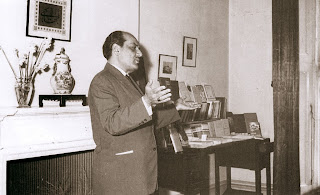Women are generally absent from the pages of the early history
of the Bábi-Bahá'í Faith and there are reasons for it. Their absence is better understood
by older believers from Iran and other Middle Eastern countries, for they are
familiar with the dynamics at work. These believers rarely saw a woman's name
and particulars appear in a history book and this seemed acceptable. They were raised
in the cradle of gender inequality and witnessed biases against women all their
lives. Almost all women were victims of prejudices that pushed them into oblivion.
The older believers were well familiar with the social and religious background
giving rise to the marginalization of women in history. They knew that the causes
had deep roots and could not be eliminated without education and concerted
effort. Some had more important things to do, such as struggling to stay alive
and saving their souls. Others did not know any better. To them things looked
all right as they were. However, it became increasingly difficult for them to convince
the younger generation - the beneficiaries of the principle of gender equality brought
by Baha'u'llah - not to challenge the status quo. The slow pace of progress acceptable to older Bahá'ís
is insufficient for those who crave tangible and meaningful change.
One area where change is desperately needed is in the way women
are treated in history. Lack of information about most of the early women believers,
including the women closely related to the Central Figures of the Faith, raises
questions about who they were, how they lived their lives, what contribution they
made to the progress of the Faith and so on. Bridging the gap between the exercise
of unlimited patience towards the unequal treatment of women in history advocated
by older believers and the eagerness of the younger generation to ensure that
they are not deprived of an important part of their heritage requires conscientious
and systematic effort. A significant part of that effort lies in delving into
and studying the lives of the early women believers who played an important role,
through suffering and working behind the scenes, in shaping historical events. The
effort also includes an analysis and assessment of the factors that prompted
historians to discuss historical events without disclosing in full the names
and particulars of female participants.






